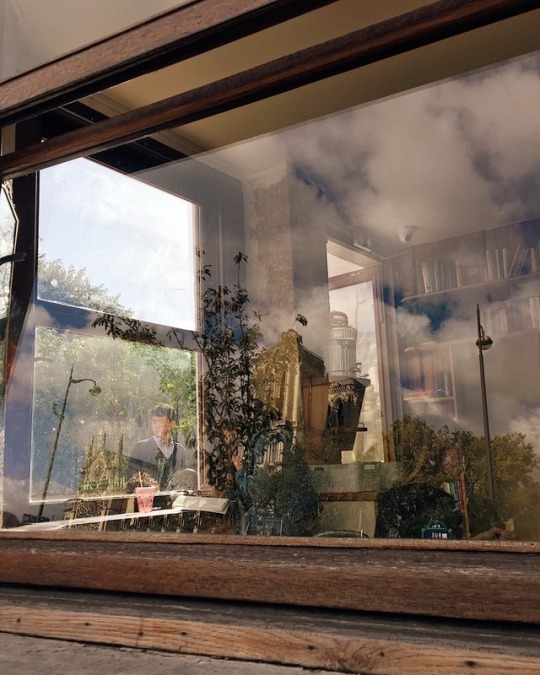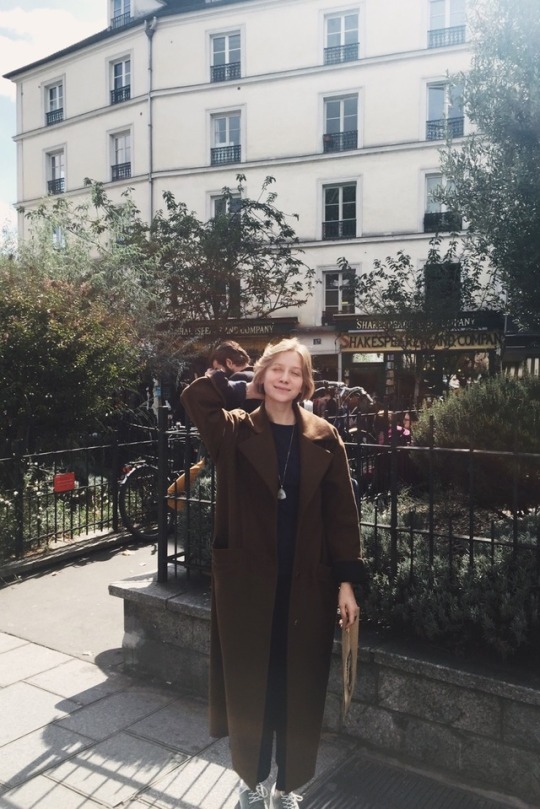Text
Hi, my name is Alina
And I want to work with Shakespeare&Company as a content manager the bookstore’s story-teller. To use the power of social media for good and inspire people to read and write.
This web-page is my little project, aimed to clarify the idea and explain what I would like to offer to the place I love the most in the city I love the most.
Here is my email: [email protected]
And a link of my Instagram-blog: https://www.instagram.com/alinamerlinn/
0 notes
Photo

How then and now become one
Why: To make Shakespeare&Co a place where people make discoveries finding books which open their eyes, touch their souls and invite them to the whole world of literature. Even if they hesitate somewhere next to the very entrance or believe “it is not for them”.
The main idea is to expand on the bookshop and its position in popular culture as not only a touristic destination. To make it a place where the big literature starts for ones and dwells, remains for others. Where fascinating bohemian image of the passed century is not just conserved, but is alive. How could we achieve it? We should speak.
Speak to make the shop the very heart of the artistic world: a shelter for dreamers and freedom space for those who know or feel or want to feel the power of the word.
But firstly, we should show why Shakespeare&Co is The Place. And so open the doors and tell everyone its story.
And we have the voice for it: we have the power of the Internet.
0 notes
Text
The Idea Grows
One could say that such things as Instagram or a blog don’t harmonise with the ambiance of the place. But aren’t they a platform what permits to inspire a new community of pure and curious souls: of ones who read and write. Like-minded people need a shelter and the shop is the place. But, probably, now our voice in the world of globalisation is even more important than ever.
Imagine, people, not many but most of them, coming not just to take a photo or to buy a souvenir but to find that book which story spoke to them by such a simple thing as a post on Instagram.
People come here because of the beats and the lost generation. They are fascinated by the mysterious ambience, but the ambience itself looks, probably, out of reach. So they don’t believe they belong to it as much as “real writers” do.
We can speak, take people by their hands and walk with them through the history. And also let them create the history themselves.
0 notes
Photo

Posts, little postcards of our days, each dedicated to someone who was or is a part of Shakespeare&Co, or to a book, or to a writer. Or even to a reader who travels and has stories to tell. Why not to tell stories of everyday’s “Tumbleweeds”?
And isn’t it the right way to inspire people to read and write? They can be easily fascinated by a thing if only someone opens their eyes. By chance, by the smallest step.
As in one essay of Proust, Chardin opens a young man’s eyes showing him the exquisite beauty of simple things.
So one will come, inspired by one tiny story next to a simple photo of a door to the another world: say, a photo of that beautiful edition.
0 notes
Photo

Now, let me feed you with some “why not”’s
Why not tell the story of this guy with a funny beard whose portrait is just above the door. One could never heard about Walt Whitman, one could never know how bitter was his journey and how his poetry, as lotus grown in moody waters, become a hymn of praise to Human and the Nature.
Why not to tell them how Virginia Woolf after having read Proust’s In Search of Lost Time, said that she couldn’t write anymore as anything looked so miserable comparing to Proust. And how she wrote Mrs. Dalloway and A Room of One’s Own just after that. Why not to draw a picture of a still and silent landscape, unchanged, uninterrupted by the force of passing times. That she exquisitely described in To The Light House.
Why not to tell them the story of James Joyce? Why not to propose them to start with A portrait of the artist as a young man, a tiny book what will touch the heart of anyone who once lost their identity and made their path themselves, who raised their head deciding to be brave enough to choose another way. “ To live, to err, to fall, to triumph”. How Ulysses has grown from the young man’s poetry which is a gentle melange of two Williams: Blake and Shakespeare.
Why not to show the power of poetry? So many people told me: “it is not for them”. They didn’t really try, I always answer. We could inspire people try, and seek, and write themselves.
0 notes
Photo

What do you propose?
I propose myself as a content-maker for Shakespeare and Co’s Instagram and Blog
0 notes
Text
So, content-maker is a good word (a bit silly), but what do you mean, how should it work?
I would make the blog a kind of magazine with big posts 2-3 time a week. About new and all-time books. About writers. With “introductions” for upcoming events, so people’ll know for what and why to come or why read the book. We easily get interested in things we know something about.
Two Instagram posts every day:
The first: a picture from the shop or from the café with a wish of a good day, or with a breakfast menu, or with an annonce of an event, or a guest’s repost.
And the second: a little story of a person who once was or now is a part of Shakespeare\a little review of a book or of an edition\a post what would make anyone become interested in reading Ulysses or War and Peace.
What do I mean? I call it “stories about stories”.
0 notes
Text
Stories about stories:
As I have a habit to talk to strangers, I know how one simple story about a book can easily inspire an interest to the book itself. I love talking about books and I have stories inspired by them.
My friends, who are almost married now, meet each other because of Raymond Carver short stories. He forgot his book in a bookstore-coffeeshop where she was working. She found it and read one story that he had marked. “Why Don’t You Dance?” is the name of the story and the question she asked him when they met again.
So I could tell these stories. Not from my person but from the name of, say, an Old Writer: a fictional personage (a friend of Agathe, obviously), who lives just above the shop, and who knew in person all the writers of passed century.
0 notes
Photo

But.. Why “old writer”?
Because it is a fictional narrator who embodies the spirit of the shop.
Because I’m a writer (but I’m not old..yet) and so I am a story-teller and books have always been my friends, my shelters, and advisors.
0 notes
Text
When the idea of this project came to my mind, I’d just finished reading “How Proust Can Change Your Life”. I was inspired by the approach of Alain De Botton. He wrote a book about a book. But his essays don’t interpret the book, they unfold the interest and propose to a reader to discover the novel.
0 notes
Photo


I was in Italy when I read Hopscotch of Julio Cortazar and it convinced me that I should move to the city I had been dreaming for extremely long. I learnt French from zero to advanced level in one year and two days (the time between my first class and the exam), I applied to la Sorbonne, I moved to Paris. Now I am a student in philosophy.
I am a musician, a traveler and I write. I call myself a secret friend of books, coffeeshops and strangers. (No, I didn’t meet Woland from The Master and Margarita..yet)
1 note
·
View note
Photo

Why Shakeapeare&Co?
Well, firstly, because I love this place. I knew about it long before I arrived in Paris. It actually was my first destination here. The day I came for the first time, I bought a book of James Joyce’s poetry, took a cappuccino and a bagel with salmon. I met a woman who is now my good friend. We started talking about wether and ended up telling each other stories from our travels
Since then, I come here few times a week. I invite all my friends here and even have a special ritual for lonely evenings.
I used to to the bookstore and go upstairs, I read some poetry and, when something touched me, gave me an idea, I came to the library room, took a sit and write. With a new room, new ritual has appeared: I come, I take a sit and read one fiction and two poems from The New Yorker, an idea come, and I write.
I am known in the coffeeshop by my name, my too long coat and a habit to stay till the closing talking to strangers. I am happy to be treated with a free “one-more-coffee” and “see ya”s. I always find a place, often with a book and a pencil, usually with a notebook and a black pen.
Last week I came there every evening, and was allowed to stay one hour after closing writing this. After, I came tho the bookstore.
Should I say that now I’m sitting here with Agathe just next to my feet? Today, upstairs, I met an American-indian boy who studies photography. We had a nice conversation and he gave me his website with his photographs.
Just few minutes ago a man with his family came. His daughters’ were amazed by sudden appearance of a cat from my back.
— Her name is Agathe.
They thought it was my cat.
— No, she lives here, I said. And sometimes I think that l live here too, but its not true, unfortunately.
The man laughed and said, he used to be a frequent guest too. He is French but lives in US. It was their first day in Paris and he wanted to show the place to his family.
We ont souhaité each other une bonne soirée
I put some writings about books and an impression on the event of this Tuesday just below this post.
I would like to know if you have any ideas on the format.
Thank you
0 notes
Photo


M Train by Patti Smith
New York, French Guinea, Berlin, London, Michigan, Paris. Patti Smith called the M Train a roadmap of her life. And she gently invites you to a travel.
They were the only people upstairs. It was about 10 p.m and the shop was about to close. They met each other by chance. One was British. He has a long brown coat and kept the M Train in his hands. Another seemed French, but in fact was American. He once came to Paris for few months and stayed here for the last decade. Staying just next to a man with the M Train, he pointed to a picture on the back of the book: sunglasses next to a cup from Café De Flore.
— You should try their hot chocolate, the best one. It’s not far from here.
— I took it yesterday, he smiled. I always pleases me to see that I have followed in Patti Smith’s footsteps.
— Did you read Just Kids?
They were agree that Just Kids was more a city’s story, it was entirely dedicated to the time and people.
— It walks you through New York of the beats, it’s so real. After reading it, I felt as though Janice Joplin was my close friend and I went out of Andy Warhol’s Fabric. I even bought a film camera and started drawing.
— I found a typewriter in my family’s home, I feel you. But right, in the M Train she tells her own story, so it’s more intimate. The carnival of the beat generation is over and all we have is coffee, written memories and silent hotel rooms. Such a brotherhood.
— All-time brotherhood.
I was sorry to annonce that the shop was closing.
They went outside.
— Hot chocolate?
— For sure!
0 notes
Text
The Master and Margarita
“Follow me, reader! Who told you that there is no true, faithful, eternal love in this world! May the liar's vile tongue be cut out! Follow me, my reader, and me alone, and I will show you such a love!”
The Master and Margarita of Michail Bulgakov appeared during the Soviet Union as personal revenge and a prayer, after all the author’s works were firstly ridiculed by critics, and then prohibited by the censure.
While Bulgakov’s name was becoming more and more famous in the world, the attention of the police on him was growing. He refused to be a “soviet writer” considering such ideology as poison for human soul, and so was about to be sent in prison. But he wrote a personal letter to Stalin. There, he explained why all writers should have a chance to write. Even in the regime, even being unpublished. “Because writers are the only ones who could seize and save the real taste of the time, they are the only ones who see and tell the truth.” All his plays were removed from theaters, he was not allowed to do any work nor to move abroad. But he was free. Then, the novel came.
It was dangerous to keep the script of The Master and Margarita. To protect the novel he read it, piece by piece, to his wife who was blind and who learnt the whole story by heart.
She lived a long life. And when the censure was canceled, she dictated the novel and died just after it’s publication.
0 notes

